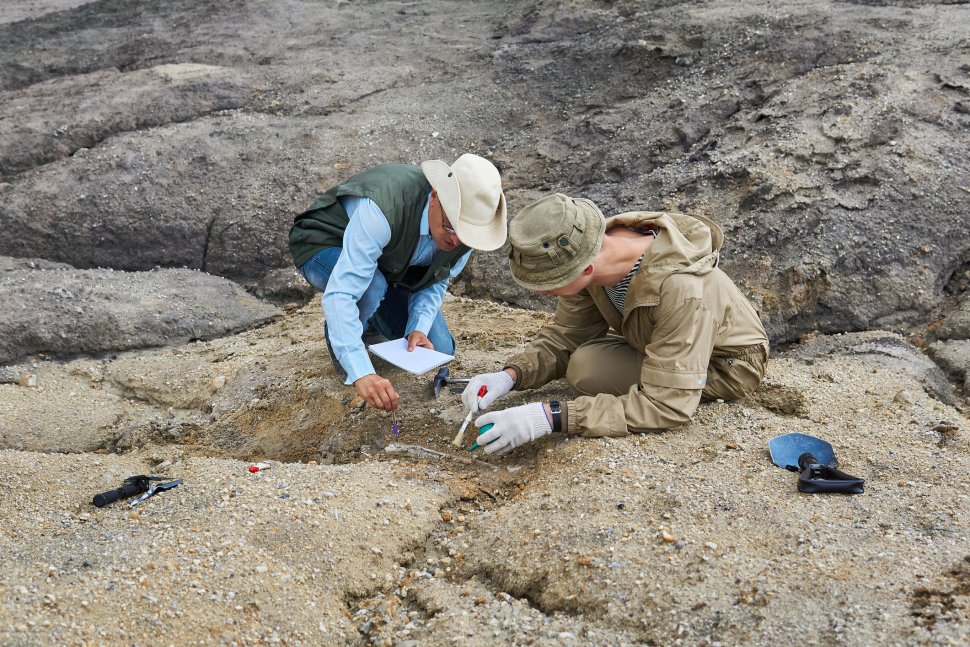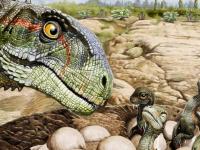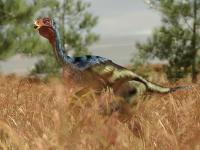What Paleontology Is and How to Work in This Field

Paleontology combines geology and biology in the study of dinosaurs and other ancient life forms.
MANY AMAZING PLANTS AND animals that once existed on this planet are now extinct, but there are remnants of these life forms. Ancient fossils and DNA provide a glimpse into the world as it was for dinosaurs and other long-gone organisms, and humans can examine living species that are related to those that have vanished.
Someone who is fascinated by the flora, fauna and creatures of the distant past and who is inspired by the wonder of nature might consider studying paleontology.
What Is Paleontology and What Does a Paleontologist Do?
Paleontology focuses on the many living things that once existed but disappeared, and the academic discipline generally hones in on species from at least 12,000 years ago. People who work in this field compare it to time travel.
"I get to see things that very few other people get to see and, through my work, I can resurrect entire lost worlds," says Nizar Ibrahim, a paleontologist and National Geographic Explorer who was part of a team that recently found tail bones of a Spinosaurus dinosaur in the Sahara Desert. The bones were a noteworthy discovery because their structure indicates that the Spinosaurus, which was larger than the Tyrannosaurus Rex, could swim.
Ibrahim, an associate professor of biology at the University of Detroit Mercy, says he enjoys the process of reconstructing the past. "We're piecing together an entire ancient ecosystem, and in some cases, resurrecting creatures that are entirely new to science, and that's a pretty magical experience."
Bill DiMichele, president of the nonprofit Paleontological Society, says paleontology sometimes feels surreal because discoveries are often awe-inspiring.
"The worlds of the past present us with life forms almost beyond our imagination – if fossil evidence did not reveal their existence, no one ever would have thought of them," DiMichele wrote in an email.
"Who could imagine reptiles the size of a bus, or the bizarre plants of Coal Age tropical swamps, or the strange animals of the Burgess Shale? Who could have envisioned vast extinction events, wiping out nearly all the species living in our oceans? – yet it happened, more than once. Not only is the material of paleontology wondrous, and beautiful, but it opens the door to ask questions about, as it is now popular to say, 'how the world works.'"
Examination of the past sometimes disproves prevailing assumptions about what is biologically inevitable, he explains.
Paleontology requires a combination of earth science and biological science, and it encompasses all forms of ancient life, including not only dinosaurs but also microorganisms, according to paleontologists.
Lawrence Witmer, the Chang Ying-Chien Professor of Paleontology at Ohio University – where he is also a professor of anatomy – says a common misconception about paleontologists is that they only do field work.
"The image that a lot of people have is some scruffy-looking person traipsing around the badlands, looking for the glint of fossils," he says. While this is the essence of what some paleontologists do, he notes, it is not the only thing they do.
"There are other folks like myself that actually do other things that are more laboratory-based or (who are) working in museums, looking at the skeletons of dinosaurs that were collected in previous years," says Witmer, whose research illuminates the characteristics of ancient creatures' soft tissues. His insights supplement knowledge based on those creatures' skeletons, which helps to clarify evolutionary history.
Paleontologist Jobs and How to Start a Paleontology Career
Paleontology experts note a wide range of jobs in the field, each of which may require slightly different academic credentials.
Aspiring paleontology researchers generally need to obtain a science doctorate in order to pursue that career, DiMichele says, but people who wish to manage fossil collections can opt for either a master's or doctorate.
There are also jobs in fossil preparation, which involves artfully removing rock from a fossil and then figuring out how to display that fossil. Someone could pursue that type of job with a bachelor's degree, and it may even be possible to secure a position in that field without attending college, DiMichele explains.
"It must also be noted that many advances in the field of paleontology are made by amateurs, those for whom paleontology is an avocation rather than a profession," he adds.
Experts note that despite the frequency of dinosaur imagery and stories in pop culture, jobs associated with dinosaurs are rare. They say that it can be difficult to secure a first permanent position as a professional paleontologist.
Thomas D. Carr, a paleontologist who has identified several new dinosaur species previously unknown to science, says paleontology is a prestigious profession that is difficult to enter.
"This is a competitive field, so the student should be top in their class and have a lot of interest in the topic," says Carr, an associate professor of biology at Carthage College in Wisconsin and director of its Institute of Paleontology. "Also, top grades are going to make all the difference to stand out in this field."
Paleontologists note that mentorship is crucial and urge prospective paleontology students to seek out a program where they will have a good mentor.
Experts note that salaries vary widely within the field of paleontology, depending on the employer and a worker's rank in the organization's hierarchy, but they caution that pay tends to be generally modest.
Whitmer estimates that a newly hired paleontology assistant professor at a college or university would earn a salary in the range of $60,000 to $80,000 and says that museums often pay less than academic institutions.
"None of us are getting into this field to be rich," Witmer explains. "We're getting into this field because it allows us to do something for which we have a passion and, hopefully some aptitude."
Source: www.usnews.com/








